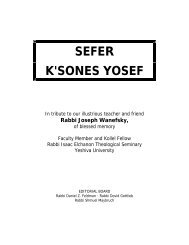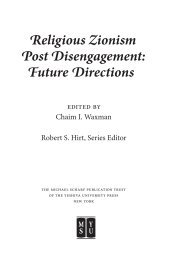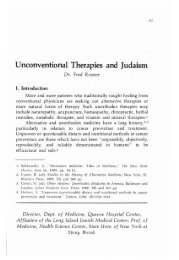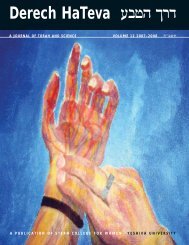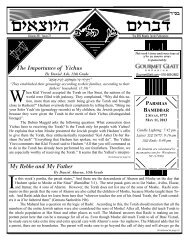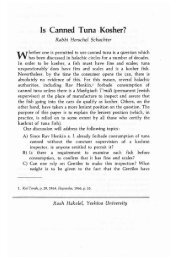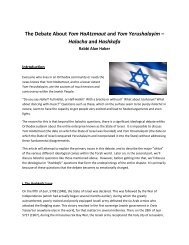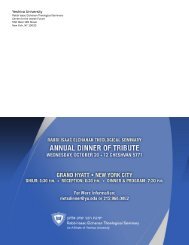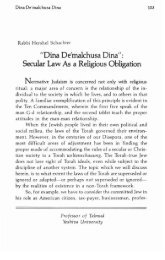yeshiva university • purim to-go • adar 5771 - YU Torah Online
yeshiva university • purim to-go • adar 5771 - YU Torah Online
yeshiva university • purim to-go • adar 5771 - YU Torah Online
- No tags were found...
You also want an ePaper? Increase the reach of your titles
YUMPU automatically turns print PDFs into web optimized ePapers that Google loves.
assumes that the requirement <strong>to</strong> recite Hallel is of biblical origin and one also assumes that thereis an inherent requirement <strong>to</strong> recite Hallel on Purim, one must observe both days of Purim basedon the principle of safek d'oraita l'chumra (one must be stringent on matters relating <strong>to</strong> <strong>Torah</strong>law). If one assumes that recitation of Hallel is rabbinic in nature (or that there is no inherentrequirement <strong>to</strong> recite Hallel), one may be lenient and observe only one of the days.Second, R. Ya'akov B. Zolty (1920-1982), Mishnat Ya'avetz, Orach Chaim no. 77, notes that R.Nachman's opinion sheds light on the nature of the daytime reading of the Megillah. Tosafot,Megillah 4a, s.v. Chayav, quote the opinion of Rabbeinu Yitzchak that the daytime reading isconsidered the primary reading. Therefore, although one recites the beracha of Shehechiyanubefore the nighttime reading, one repeats the beracha at the daytime reading. Rambam, HilchotMegillah U'Chanukah 1:3, rules that one should not recite Shehechiyanu during the daytimereading.R. Zolty explains that Rambam's opinion is that the daytime reading is not the primaryfulfillment of the mitzvah of reading the Megillah. The Mishna, Megillah 20b, states that one canonly recite Hallel during the day. Therefore, it is possible that the primary impetus <strong>to</strong> institute adaytime reading was <strong>to</strong> fulfill the requirement <strong>to</strong> recite Hallel. As such, there are two aspects ofthe daytime reading, neither of which warrants recitation of Shehechiyanu. The Hallel aspectdoes not warrant a Shehechiyanu since one does not ordinarily recite Shehechiyanu on therecitation of Hallel. The inherent obligation <strong>to</strong> repeat the reading of the Megillah during thedaytime does not warrant a Shehechiyanu since the Shehechiyanu was already recited at thenighttime reading. A second recitation of Shehechiyanu is only logical according <strong>to</strong> RabbeinuYitzchak's opinion that the primary reading is during the daytime.Third, R. Moshe Sofer, Chatam Sofer, Orach Chaim no. 51, notes that there are three principlesthat ostensibly cannot coexist. 1) The Mishna's principle (Megillah 21a) that the Megillah canbe read standing or sitting. 2) The principle of Shibolei HaLeket, no. 173, codified by ShulchanAruch, Orach Chaim 422:7, that Hallel must be recited in the standing position. 3) R.Nachman's principle that reading the Megillah fulfills the requirement <strong>to</strong> recite Hallel on Purim.If one assumes that Hallel must be recited standing and that reading of the Megillah fulfills therequirement <strong>to</strong> recite Hallel, how does the Mishna allow one <strong>to</strong> read the Megillah while seated?R. Zolty, op. cit., without directly referencing Chatam Sofer's question, notes that the leniency <strong>to</strong>read the Megillah while seated may be contingent on whether one accepts R. Nachman'sopinion. Tur, Orach Chaim no. 590, rules that although one can fulfill the mitzvah if he reads theMegillah in the sitting position, ideally, one should only read the Megillah in the standingposition. Ran, Megillah 11b, s.v. HaKorei, rules that even in an ideal situation one may read theMegillah in the sitting position. R. Zolty explains that Tur's reluctance <strong>to</strong> allow reading theMegillah in the sitting position is a function of R. Nachman's opinion that reading the Megillahfulfills the requirement <strong>to</strong> recite Hallel on Purim. Since Hallel is recited in the standing position,the Megillah should ideally be read in the standing position. R. Zolty further explains that sincethe reason <strong>to</strong> read the Megillah standing is due <strong>to</strong> the obligation <strong>to</strong> recite Hallel, Tur would agreethat at the nighttime reading - which does not serve <strong>to</strong> fulfill the obligation <strong>to</strong> recite Hallel - thereis no insistence on standing for the reading of the Megillah.24YESHIVA UNIVERSITY <strong>•</strong> PURIM TO-GO <strong>•</strong> ADAR <strong>5771</strong>



